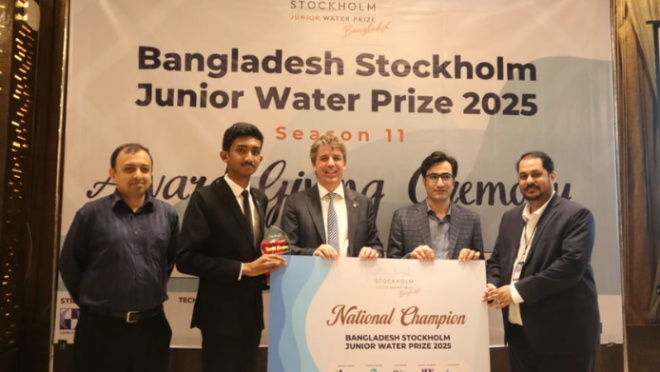Stockholm Junior Water Prize Bangladesh: Zabeer’s mission to ensure safer water
Stockholm Junior Water Prize Bangladesh: Zabeer’s mission to ensure safer water

Zabeer Zarif Akhter, a Class 12 student from St Joseph Higher Secondary School in Dhaka has once again brought national recognition to Bangladesh by winning the Stockholm Junior Water Prize (SJWP) Bangladesh chapter.
For the second consecutive year, Zabeer earned the national title through an innovative project that integrates artificial intelligence, machine learning, and the Internet of Things to monitor water quality in real time. “My project uses AI to deliver real-time, portable water quality monitoring, something not previously developed in this field,” he shares.
The innovation is designed to overcome the limitations of traditional water testing, which can take over five days in professional laboratories such as BCSIR and icddr,b. This compact device, priced at just Tk1,500, uses spectroscopy and electrical measurements to detect contaminants. “It’s eco-friendly, affordable and novel, making it a viable solution where lab facilities are not accessible,” he adds.
The device has significant potential to impact water safety in disaster-prone zones, rural regions, and industrial settings. With its use of UV, IR, and Raman spectroscopy, it can detect pathogens, heavy metals, and volatile organic compounds with 97% accuracy.
“Users receive instant data, enabling them to take immediate action against contamination,” Zarif explains.
His journey to the international final in Sweden, which will likely be held in August, began with a rigorous selection process. Thousands of research papers on water-related issues were submitted, and six teams were shortlisted for final presentations at ITN-BUET.
“We presented our work before a panel that included BUET professors, UNICEF and WaterAid officials, civil engineers and water specialists,” he says, noting that the panel unanimously chose him as the national winner.
Despite the availability of mentorship through the House of Volunteers Foundation, this year’s champion chose to work independently. He had already represented Bangladesh at the global final in 2024, receiving a diploma for scientific excellence. “Since I’ve been in this field from a young age and already competed last year, I didn’t require mentorship this time,” he remarks. However, he acknowledges the organiser’s efforts to support young researchers with guidance on research writing and problem-solving.
Although he has previously visited Sweden as a finalist, the excitement remains the same. He looks forward to the cultural and academic exchange and values the chance to meet fellow innovators. “I’m especially excited about meeting the Swedish Royal Family and attending the dinner at Stockholm City Hall, where Nobel Laureates dine,” he says with a smile, hoping to return with further accolades for Bangladesh.
From Dhaka to Rochester, preparing for the genius olympiad
In June, Zarif along with his teammate Md Twashin Ilahi will represent Bangladesh at another global platform, the Genius Olympiad hosted by the Rochester Institute of Technology. This prestigious event showcases high school students’ work across science, robotics, business, and culture.
“It’s an honour to be selected as the only team from Bangladesh, especially after eight years,” he shares.
The selection process was highly competitive. Participants were required to submit a research paper, a visual quad chart, and a five-minute video presentation. With only 18% of applicants in the science category making it to the finals, their achievement is significant. “We were thrilled when we got the invitation to present at the international round,” he adds.
For this competition, the team submitted two projects. One focuses on zinc oxide-based photocatalysis combined with high-frequency plasma technology for industrial water treatment, while the other further develops the real-time monitoring system. “We wanted to explore both industrial and community-level solutions for water purification.”
Beyond awards, the Genius Olympiad offers global exposure and academic opportunities. Finalists are eligible for partial merit scholarships at RIT, and some may receive full tuition scholarships or conditional admission offers. Winners in the science segment can also publish in international peer-reviewed journals, which is an incredible opportunity.
The team has prioritised the Genius Olympiad to refine their research and share ideas on a global stage. “We believe participating in this competition will help us grow as innovators and improve our project’s practical impact,” he concludes.


